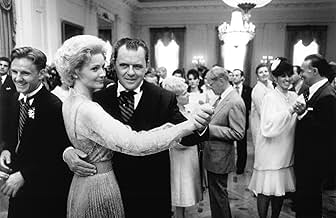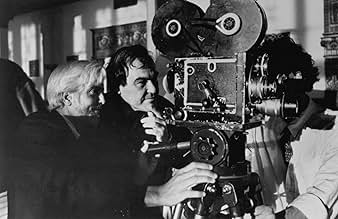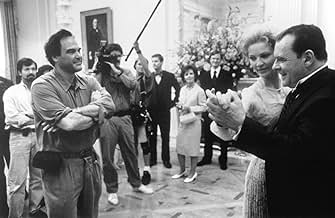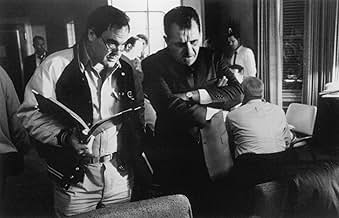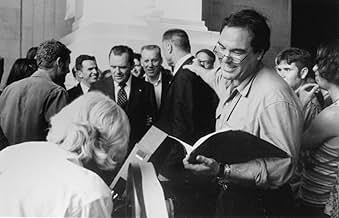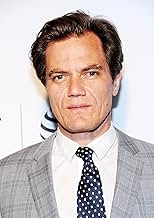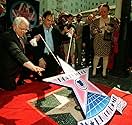Biografía del expresidente estadounidense Richard Nixon, desde sus días de niño hasta su eventual presidencia, que terminó en vergüenza.Biografía del expresidente estadounidense Richard Nixon, desde sus días de niño hasta su eventual presidencia, que terminó en vergüenza.Biografía del expresidente estadounidense Richard Nixon, desde sus días de niño hasta su eventual presidencia, que terminó en vergüenza.
- Dirección
- Guionistas
- Elenco
- Nominado a 4 premios Óscar
- 11 premios ganados y 18 nominaciones en total
- Dirección
- Guionistas
- Todo el elenco y el equipo
- Producción, taquilla y más en IMDbPro
Opiniones destacadas
Hopkins is remarkable as Nixon. Wisely not even trying for an exact likeness, his interpretation of that so-familiar physicality is uncannily evocative. From the very start, the characterisation is spot-on - the jut of the lower jaw, the growly voice, the rounded shoulders. Once the viewer has adjusted to the initial shock, Hopkins IS Nixon. It ceases to be an issue.
Theodore Roosevelt, Washington, Kennedy and (most of all) Lincoln look down from the White House walls at Nixon, their solemn portraits hovering like admonishing ghosts over the Watergate squalor. In life, Roosevelt was bold and self-assured, whereas Nixon dithers: Washington's self-effacing propriety confronts a Nixon who is suggesting that the Nazis were right. Kennedy is everything that Nixon could never be - above all else, at ease with himself. Lincoln looks down, from the office wall and from his marble seat in the Memorial, in silent rebuke as his successor debases the presidency.
Some of the camera tricks don't work. We see Nixon rooted to the spot at Love Field as the camera soars up and away from him. Why? Obtrusive camera movement is justified only if it adds to our understanding of character or plot. This shot seems to have been included merely for its cleverness. The same is true of the little flashes of black-and-white which keep interrupting the action. At one point, in a dialogue between Nixon and Haldeman, the focus is un-subtly and repeatedly thrown from one man to the other. What does this achieve? Is some artistic goal being pursued, or are the effects included for their own sake? What is the symbolic importance (if any) of the vanishing racehorses?
Much of the attention to detail is of a very high order. Stone's writing team has done its homework, and we get authentic touches such as Nixon's love of log fires, which meant having to run the White House air conditioning system at full blast during summer. The reconstructions of the White House interiors are superb. We see Nixon and Pat engaging in a domestic scrap beneath murals of more edifying battles like Yorktown and Saratoga. Historical events, recorded on news film at the time, are brilliantly reconstituted, replacing the real Nixon with the Hopkins version. Thus we get convincing reconstructions of the Kennedy TV debate and the 1962 'retirement' speech. Young Nixon's courtship of Pat is narrated without dialogue as a grainy, jumpy home movie - and is beautifully done. I did not feel quite so positive about the Alger Hiss segment. Welles did this 'newsreel flashback' idea in "Citizen Kane" more than half a century earlier, and did it with such flair that anything which follows is sure to look jaded. It also seemed to me that this passage is badly-placed, coming immediately after the 1962 California defeat.
James Wood plays Bob Haldeman, and does his usual admirable, photogenic best. My quibble with the characterisation is, this isn't THE Haldeman. The historical personage was grimmer, more stately, more formidable (Fred Emery's "Watergate" bears this out). Wood is restricted here to the role of an aide, rather than the Chief of the White House Staff, an emperor within his own (not inconsiderable) domain.
Pat Nixon does not ring true either, but for different reasons. Joan Allen is more than competent as the steely, astute power behind the Nixon throne. The fault is in the characterisation rather than the actor. The real Pat was (so far as one can judge) an altogether less articulate, less philosophical, less knowing individual. Watch her in the REAL "Checkers" broadcast - she is a stiff, repressed, passive woman, a true 1950's Republican wife, not the power broker that this film would have us believe. It is hard to accept, for example, that Nixon's decision to retire in 1962 was his wife's diktat.
There are elements of this otherwise excellent film which simply don't work. Would the President of the United States REALLY be pulled out of a face-to-face meeting with Brezhnev to deal with some Watergate minutiae? The real-life Mitchell said that he tolerated Martha's indiscretions "because I love her". This touching declaration is cheapened in the film, for no good reason. Similarly, Tricia Nixon's exchange with her father was, in real life, an assertion of unconditional loyalty which was both moving and very much to Nixon's credit. The film version has her asking sceptically, "Did you cover up?" This is quite wrong. The Nixon women would have considered it treachery even to frame such a question.
John Williams' epic score is in keeping with the classical tragedy acted out before us. Nixon's tearful prayer with Kissinger and the farewell speech to the White House staff are scenes of extraordinary power.
Paul Sorvino gives us a marvellous Kissinger, though in my humble opinion Stone goes too far when he makes Kissinger the White House 'leaker' and accuses the Secretary of State of complicity in the Watergate break-ins.
One scene which works splendidly is the (true) incident at the Lincoln Memorial. Nixon tries to glad-hand the indignant youngsters, using the hearty, patronising approach of a bygone generation. The sad revulsion of the protesters shows the gulf between Nixon's consciousness and the spirit of the age.
"I hope I haven't let you down" is uttered one single time by Nixon, towards the end of the film. The truth is, he hit on this formula of words and used it again and again during the final days of his presidency. It was a last desperate attempt to tweak our sympathy-nodes. As such, it was utterly gauche, utterly craven, utterly guileful, yet utterly unrealistic. In fact, utterly Nixon.
Theodore Roosevelt, Washington, Kennedy and (most of all) Lincoln look down from the White House walls at Nixon, their solemn portraits hovering like admonishing ghosts over the Watergate squalor. In life, Roosevelt was bold and self-assured, whereas Nixon dithers: Washington's self-effacing propriety confronts a Nixon who is suggesting that the Nazis were right. Kennedy is everything that Nixon could never be - above all else, at ease with himself. Lincoln looks down, from the office wall and from his marble seat in the Memorial, in silent rebuke as his successor debases the presidency.
Some of the camera tricks don't work. We see Nixon rooted to the spot at Love Field as the camera soars up and away from him. Why? Obtrusive camera movement is justified only if it adds to our understanding of character or plot. This shot seems to have been included merely for its cleverness. The same is true of the little flashes of black-and-white which keep interrupting the action. At one point, in a dialogue between Nixon and Haldeman, the focus is un-subtly and repeatedly thrown from one man to the other. What does this achieve? Is some artistic goal being pursued, or are the effects included for their own sake? What is the symbolic importance (if any) of the vanishing racehorses?
Much of the attention to detail is of a very high order. Stone's writing team has done its homework, and we get authentic touches such as Nixon's love of log fires, which meant having to run the White House air conditioning system at full blast during summer. The reconstructions of the White House interiors are superb. We see Nixon and Pat engaging in a domestic scrap beneath murals of more edifying battles like Yorktown and Saratoga. Historical events, recorded on news film at the time, are brilliantly reconstituted, replacing the real Nixon with the Hopkins version. Thus we get convincing reconstructions of the Kennedy TV debate and the 1962 'retirement' speech. Young Nixon's courtship of Pat is narrated without dialogue as a grainy, jumpy home movie - and is beautifully done. I did not feel quite so positive about the Alger Hiss segment. Welles did this 'newsreel flashback' idea in "Citizen Kane" more than half a century earlier, and did it with such flair that anything which follows is sure to look jaded. It also seemed to me that this passage is badly-placed, coming immediately after the 1962 California defeat.
James Wood plays Bob Haldeman, and does his usual admirable, photogenic best. My quibble with the characterisation is, this isn't THE Haldeman. The historical personage was grimmer, more stately, more formidable (Fred Emery's "Watergate" bears this out). Wood is restricted here to the role of an aide, rather than the Chief of the White House Staff, an emperor within his own (not inconsiderable) domain.
Pat Nixon does not ring true either, but for different reasons. Joan Allen is more than competent as the steely, astute power behind the Nixon throne. The fault is in the characterisation rather than the actor. The real Pat was (so far as one can judge) an altogether less articulate, less philosophical, less knowing individual. Watch her in the REAL "Checkers" broadcast - she is a stiff, repressed, passive woman, a true 1950's Republican wife, not the power broker that this film would have us believe. It is hard to accept, for example, that Nixon's decision to retire in 1962 was his wife's diktat.
There are elements of this otherwise excellent film which simply don't work. Would the President of the United States REALLY be pulled out of a face-to-face meeting with Brezhnev to deal with some Watergate minutiae? The real-life Mitchell said that he tolerated Martha's indiscretions "because I love her". This touching declaration is cheapened in the film, for no good reason. Similarly, Tricia Nixon's exchange with her father was, in real life, an assertion of unconditional loyalty which was both moving and very much to Nixon's credit. The film version has her asking sceptically, "Did you cover up?" This is quite wrong. The Nixon women would have considered it treachery even to frame such a question.
John Williams' epic score is in keeping with the classical tragedy acted out before us. Nixon's tearful prayer with Kissinger and the farewell speech to the White House staff are scenes of extraordinary power.
Paul Sorvino gives us a marvellous Kissinger, though in my humble opinion Stone goes too far when he makes Kissinger the White House 'leaker' and accuses the Secretary of State of complicity in the Watergate break-ins.
One scene which works splendidly is the (true) incident at the Lincoln Memorial. Nixon tries to glad-hand the indignant youngsters, using the hearty, patronising approach of a bygone generation. The sad revulsion of the protesters shows the gulf between Nixon's consciousness and the spirit of the age.
"I hope I haven't let you down" is uttered one single time by Nixon, towards the end of the film. The truth is, he hit on this formula of words and used it again and again during the final days of his presidency. It was a last desperate attempt to tweak our sympathy-nodes. As such, it was utterly gauche, utterly craven, utterly guileful, yet utterly unrealistic. In fact, utterly Nixon.
In an overall solid cast, Anthony Hopkins shines in a powerful performance as Richard Nixon in this Oliver Stone film tracing the former president's life from his boyhood in California to his resignation as U.S. President in 1974.
Nixon is seen as a troubled figure, insecure and paranoid, with few friends. An unhappy childhood, in which he refers to himself as his mother's "faithful dog," in fact does dog him his whole life, as he seeks to please a demanding ultra-religious mother (Mary Steenburgen)who had already died by the time he took office as President, but whose memory and expectations lived on. Nixon is burdened with an unhappy marriage to Pat (Joan Allen) - unhappy largely because of his own obsession with political success - and haunted by the ghost of John Kennedy, who defeated him for the presidency in 1960 and who Nixon could never live up to. Kennedy was loved; Nixon was hated - he could never get over that. A scene near the end of the movie demonstrates his feelings toward JFK as he looks at Kennedy's White House portrait: "They look at you and see what they want to be; they look at me and see who they are."
Although the movie - as any review of Nixon's life will - revolves around Watergate, it provides a fascinating summary of his life, and of what added up to make him the troubled and lonely figure he really was. There's also typical Oliver Stone material as dark hints of conspiracy extending far beyond Watergate are inserted. Perhaps the most unsettling being a meeting Nixon has shortly before JFK's assassination with some supporters in Texas who are trying to convince him to run for the presidency again in 1964. Nixon protests that Kennedy can't be beaten in '64. A Cuban American present says ominously "What if Kennedy doesn't run in '64?"
A truly fascinating portrayal of a fascinating man, even in the end somewhat sympathetic to Nixon as the film ends with his 1994 funeral service, some comments at that service by President Clinton and a summary of his career by a narrator pointing out his accomplishments. A last note: kudos to Paul Sorvino, who hit Henry Kissinger bang on.
8/10
Nixon is seen as a troubled figure, insecure and paranoid, with few friends. An unhappy childhood, in which he refers to himself as his mother's "faithful dog," in fact does dog him his whole life, as he seeks to please a demanding ultra-religious mother (Mary Steenburgen)who had already died by the time he took office as President, but whose memory and expectations lived on. Nixon is burdened with an unhappy marriage to Pat (Joan Allen) - unhappy largely because of his own obsession with political success - and haunted by the ghost of John Kennedy, who defeated him for the presidency in 1960 and who Nixon could never live up to. Kennedy was loved; Nixon was hated - he could never get over that. A scene near the end of the movie demonstrates his feelings toward JFK as he looks at Kennedy's White House portrait: "They look at you and see what they want to be; they look at me and see who they are."
Although the movie - as any review of Nixon's life will - revolves around Watergate, it provides a fascinating summary of his life, and of what added up to make him the troubled and lonely figure he really was. There's also typical Oliver Stone material as dark hints of conspiracy extending far beyond Watergate are inserted. Perhaps the most unsettling being a meeting Nixon has shortly before JFK's assassination with some supporters in Texas who are trying to convince him to run for the presidency again in 1964. Nixon protests that Kennedy can't be beaten in '64. A Cuban American present says ominously "What if Kennedy doesn't run in '64?"
A truly fascinating portrayal of a fascinating man, even in the end somewhat sympathetic to Nixon as the film ends with his 1994 funeral service, some comments at that service by President Clinton and a summary of his career by a narrator pointing out his accomplishments. A last note: kudos to Paul Sorvino, who hit Henry Kissinger bang on.
8/10
I will start by saying I am an Oliver Stone fan. For some particular reason though I did not expect to like this movie but obviously I did. He actually unexpectedly gave a very fair depiction of Nixon. Nixon really transformed before my eyes in here. That was really something special to see.
The acting was quite good. Anthony Hopkins though totally uplifted this movie. I could imagine many people saying his performance was over-the-top or a bit too surreal at times. Yet that is what really made his performance so amazing. The way he was able to transform the many crazy and totally off the wall aspects of Nixon and make them into a reality. To me as the movie went on I felt I was in some way able to see his paranoia, anxiety, thirst for power and just the simple fact of wanting to be liked. I could see he was more of a troubled and vulnerable man than a monster. He never quite connected with anybody which made him bitter and fueled his paranoia and greed even more. To me Hopkins portrayed this all perfectly, all the complexities and inner feelings of Nixon. Hopkins slipped into this role in way that you rarely see. He became Nixon, and at times I was speechless or should I say thoughtless watching him portray such an important figure in such a way. More and more I felt sorry for Nixon, as he looked more and more like a schizophrenic. To me this role was more psychologically bone-chilling than his role as Hannibal Lechter in Silence of the Lambs and I have no problem debating that.
The rest of the cast was quite good as well. Joan Allen was very good in showing the complex relationship/marriage she had with Richard Nixon. James Woods freaked me out at times displaying that pure evil and hatred at times that Hopkins showed as Nixon. Paul Sorvino was very good as Henry Kissinger. Mary Steenburgen was interesting to watch in the very limited time she played in here. The two actors though other than Hopkins though that really stood out to me were Bob Hoskins and Sam Waterston. Despite Hoskins not giving an amazing performance and having very limited time he gave me chills just seeing J. Edgar Hoover being portrayed in some sort of way. Sam Waterston despite being limited to really just one scene was even more chilling than the rest of the cast(excluding Hopkins) combined in that one moment. That moment was one of the most intense face to face scenes that I have ever seen. It was so memorable.
The directing was very good. It was not the best I have seen from Oliver Stone but it was up there. For the first 45 minutes or so I was a bit confused about what was happening and the flow of the movie but I got used to it. The first portion of the movie did feel unbalanced at times but the feel of the movie got better as it wore on. Going back to that one scene between Sam Waterston and Anthony Hopkins, I felt this scene was one of the best directed and written scenes I have seen from Oliver Stone or anyone ever. That scene was a microcosm of the movie. The motion-sickness, mind scrambling, paranoid feeling of that scene captured the entire movie. The feeling of even seeing the president himself being treated like a puppet, despite not that shocking, was mind numbing to watch. That scene was true testament to the writing and directing abilities of Oliver Stone.
The writing was also very good throughout. It seemed as if everything Stone wanted to get across got across. The writing was not amazing but it certainly served it duty. The cinematography was great though. Stone always knows how to get his point across in the way he photographs a movie even if all of other aspects of the movie fail. That dark Oliver Stonish feeling kept on creeping in on every scene, but also that dark psychological feeling that he had put in Born On the Fourth of July and Platoon also was felt through the cinematography. The music by John Williams, who always knows how to capture a moment musically, was simply perfect in here again.
I can understand this movie being boring to a lot of people or it being considered propaganda. Yet I think this movie is an overlooked masterpiece. Just seeing Anthony Hopkins perform as Nixon is a good enough reason to see this movie. He took control of this movie by force and took it to another level. Despite this being an Oliver Stone movie it is more fair than you would think. Of course this movie may have a few conspiracy theories included in it but Oliver Stone never forces his theories on people. There is a reason why at the beginning at every movie he puts a disclaimer saying that not everything in his movies are facts. Despite it being great I don't know if this is a movie for everyone. This movie seems to be crazy and surreal but isn't that how life seems to be at times as well?
The acting was quite good. Anthony Hopkins though totally uplifted this movie. I could imagine many people saying his performance was over-the-top or a bit too surreal at times. Yet that is what really made his performance so amazing. The way he was able to transform the many crazy and totally off the wall aspects of Nixon and make them into a reality. To me as the movie went on I felt I was in some way able to see his paranoia, anxiety, thirst for power and just the simple fact of wanting to be liked. I could see he was more of a troubled and vulnerable man than a monster. He never quite connected with anybody which made him bitter and fueled his paranoia and greed even more. To me Hopkins portrayed this all perfectly, all the complexities and inner feelings of Nixon. Hopkins slipped into this role in way that you rarely see. He became Nixon, and at times I was speechless or should I say thoughtless watching him portray such an important figure in such a way. More and more I felt sorry for Nixon, as he looked more and more like a schizophrenic. To me this role was more psychologically bone-chilling than his role as Hannibal Lechter in Silence of the Lambs and I have no problem debating that.
The rest of the cast was quite good as well. Joan Allen was very good in showing the complex relationship/marriage she had with Richard Nixon. James Woods freaked me out at times displaying that pure evil and hatred at times that Hopkins showed as Nixon. Paul Sorvino was very good as Henry Kissinger. Mary Steenburgen was interesting to watch in the very limited time she played in here. The two actors though other than Hopkins though that really stood out to me were Bob Hoskins and Sam Waterston. Despite Hoskins not giving an amazing performance and having very limited time he gave me chills just seeing J. Edgar Hoover being portrayed in some sort of way. Sam Waterston despite being limited to really just one scene was even more chilling than the rest of the cast(excluding Hopkins) combined in that one moment. That moment was one of the most intense face to face scenes that I have ever seen. It was so memorable.
The directing was very good. It was not the best I have seen from Oliver Stone but it was up there. For the first 45 minutes or so I was a bit confused about what was happening and the flow of the movie but I got used to it. The first portion of the movie did feel unbalanced at times but the feel of the movie got better as it wore on. Going back to that one scene between Sam Waterston and Anthony Hopkins, I felt this scene was one of the best directed and written scenes I have seen from Oliver Stone or anyone ever. That scene was a microcosm of the movie. The motion-sickness, mind scrambling, paranoid feeling of that scene captured the entire movie. The feeling of even seeing the president himself being treated like a puppet, despite not that shocking, was mind numbing to watch. That scene was true testament to the writing and directing abilities of Oliver Stone.
The writing was also very good throughout. It seemed as if everything Stone wanted to get across got across. The writing was not amazing but it certainly served it duty. The cinematography was great though. Stone always knows how to get his point across in the way he photographs a movie even if all of other aspects of the movie fail. That dark Oliver Stonish feeling kept on creeping in on every scene, but also that dark psychological feeling that he had put in Born On the Fourth of July and Platoon also was felt through the cinematography. The music by John Williams, who always knows how to capture a moment musically, was simply perfect in here again.
I can understand this movie being boring to a lot of people or it being considered propaganda. Yet I think this movie is an overlooked masterpiece. Just seeing Anthony Hopkins perform as Nixon is a good enough reason to see this movie. He took control of this movie by force and took it to another level. Despite this being an Oliver Stone movie it is more fair than you would think. Of course this movie may have a few conspiracy theories included in it but Oliver Stone never forces his theories on people. There is a reason why at the beginning at every movie he puts a disclaimer saying that not everything in his movies are facts. Despite it being great I don't know if this is a movie for everyone. This movie seems to be crazy and surreal but isn't that how life seems to be at times as well?
Anthony Hopkins does not merely portray Richard Nixon as a cheap caricature, as Frank Langella did in Ron Howard's pointless Frost/Nixon. He creates a living, breathing human being that we can all relate to, while still adopting the notorious president's signature speech patterns and mannerisms.
Oliver Stone's direction is nothing short of a miracle. As in his 1991 masterpiece, JFK, he has a lot of different characters to bring to life on the screen. He helps his actors fashion their performances with miraculous accuracy. Paul Sorvino is dead-on as Henry Kissinger, as is Joan Allen as Pat Nixon, and Bob Hoskins as the mysterious, mean-spirited J. Edgar Hoover.
The writing is also represents a triumph. Stone and co. are able to synthesize entire pages of historical prose into digestible chunks of dialogue. Aspiring screenwriters should seriously take note.
Although 1995 also saw the likes of Casino, Seven, Heat, and The Usual Suspects, Nixon is the ultimate champion. History on screen has rarely been this exhilarating.
Oliver Stone's direction is nothing short of a miracle. As in his 1991 masterpiece, JFK, he has a lot of different characters to bring to life on the screen. He helps his actors fashion their performances with miraculous accuracy. Paul Sorvino is dead-on as Henry Kissinger, as is Joan Allen as Pat Nixon, and Bob Hoskins as the mysterious, mean-spirited J. Edgar Hoover.
The writing is also represents a triumph. Stone and co. are able to synthesize entire pages of historical prose into digestible chunks of dialogue. Aspiring screenwriters should seriously take note.
Although 1995 also saw the likes of Casino, Seven, Heat, and The Usual Suspects, Nixon is the ultimate champion. History on screen has rarely been this exhilarating.
Oliver Stone has a way of making films that grab you and hold you until the final frame. His films are usually controversial and that's what generates much debate and Nixon is no exception. Anthony Hopkins assumes the mantle of Richard M. Nixon and he does it with style. His Nixon is a complex man, full of ambition and dreams, but also filled with demons. Nixon lives in the shadow of JFK, and because of that, he feels he can never live up to the greatness that he aspires to. Joan Allen is equally convincing as Pat Nixon. She is a strong woman who loves her husband, but unlike Nixon, she grows tired of the political world. The film works best when we see the inner workings of the Nixon Whitehouse. We see the coverup of the Watergate break in. We see Nixon's historic visit to China and we see the final farewell of a flawed, but ambitious man. It's hard to cram an entire lifetime into a three hour film, but Stone manages to do it well. We get brief glimpses into Nixon's past and we see the events that eventually undid him. Some may say that Nixon is painted in an unfair light. I think Stone actually sympathizes with him. Here was a man who came into power in the middle of a war. He was feared by many and misunderstood by all. Nixon was able to rise above it all for a short period of time, and in that brief period, he did have the world.
¿Sabías que…?
- TriviaWriter, producer, and director Oliver Stone said he voted for Richard Nixon in 1968, based on his pledge to end the Vietnam War.
- ErroresThe film shows Nixon signing his resignation letter the day before he leaves office and prior to it being publicly announced. Historically, Nixon informed the nation in an address the night before leaving office, and then signed the letter the next day, which was his last morning in the White House.
- Citas
Richard M. Nixon: [to a portrait of Kennedy] When they look at you, they see what they want to be. When they look at me, they see what they are.
- Créditos curiososSecond opening credits: "For what is a man profited, if he shall gain the whole world, and lose his own soul?" Matthew 16:26.
- Versiones alternativasLetterbox video version features additional outtake footage, including a scene starring Sam Waterston as CIA director Richard Helms.
- Bandas sonorasMenuetto
from Schubert's "Symphony No. 2 in B Flat Major, D 125"
Written by Franz Schubert
Performed by Koninklijk Concertgebouworkest (as Royal Concertgebouw Orchestra)
Nikolaus Harnoncourt, Conductor
Courtesy of Teldec Classics International GmbH
By arrangement with Warner Special Products
Selecciones populares
Inicia sesión para calificar y agrega a la lista de videos para obtener recomendaciones personalizadas
- How long is Nixon?Con tecnología de Alexa
Detalles
Taquilla
- Presupuesto
- USD 44,000,000 (estimado)
- Total en EE. UU. y Canadá
- USD 13,681,765
- Fin de semana de estreno en EE. UU. y Canadá
- USD 2,206,506
- 25 dic 1995
- Total a nivel mundial
- USD 13,681,765
- Tiempo de ejecución3 horas 12 minutos
- Color
- Mezcla de sonido
- Relación de aspecto
- 2.39 : 1
Contribuir a esta página
Sugiere una edición o agrega el contenido que falta



